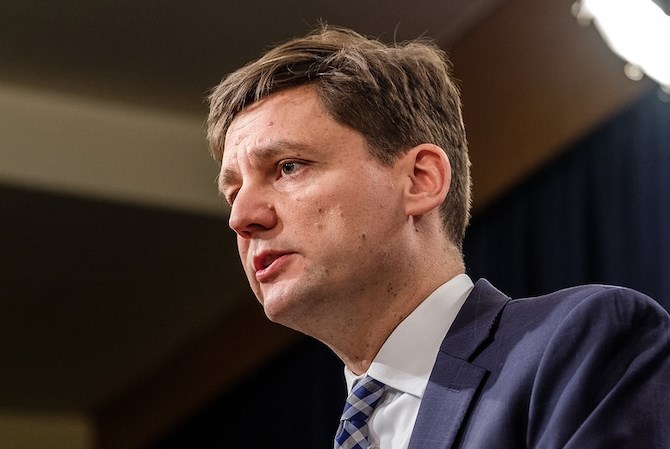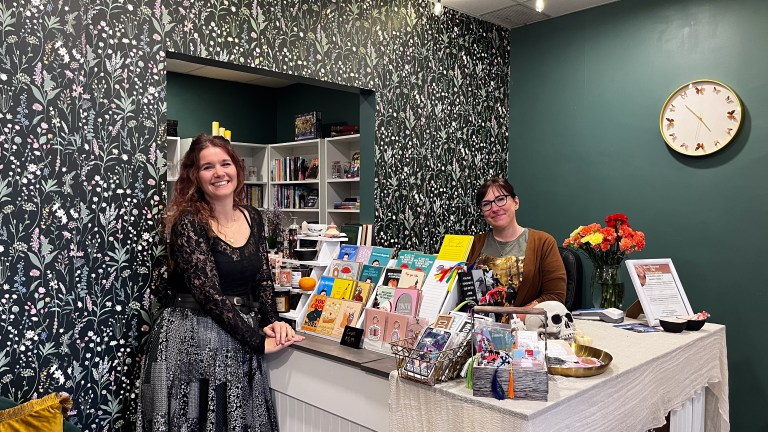Okanagan police might be the missing link in dealing with community mental health conflicts
PENTICTON – Const. James Grandy uses an example to explain his new role at Penticton RCMP detachment, why it’s important and why we could soon see a lot more officers specially trained to deal with community conflicts involving mental health.
“We had a case with a single mother who was struggling to keep her household together,” he said. “She had a teenage daughter and teenage son, and they had a good family, but they were under a lot of stress, with the husband having died earlier.”
The daughter struggled with anxiety and turned to substance abuse. The mother was in the early stages of alcoholism and police had already been there several times to deal with complaints.
“This was a family (that) was at risk of unravelling, and it was clear that if we, as a community, don’t try to assist it could be worse,” he said.
He took their file to a group of problem solvers including the RCMP, the South Okanagan Women in Need Society and the Ministry of Children and Family Development, among others who started connecting the family with services to help them get their lives together.
And it worked.
“(The family) didn’t realize there were some of those services,” said Grandy. “The police haven’t dealt with them since.”
Traditionally police wouldn’t have taken on that role of connecting community members to social services — some don’t believe they should — but times have changed and so too must policing, said Grandy.
“Local police are responding to an increasing number of mental health and addiction issues we’ve never seen like this before,” said Grandy. “It used to be a big city thing, now it’s in small towns, too.”
He estimates that 25 per cent of the incidents that RCMP attend in the Okanagan are related to mental health issues.
It’s why in April 2018 he gained the title of Mental Health Intervention Co-ordinator, a position that links the local Mounties to social agencies in the city. He’d spearheaded a similar program when he was in the Burnaby detachment of the RCMP.
“In some larger communities, such as Vancouver, they’ve had programs like this for more than a decade,” he said. “In those communities, they had a mental health crisis and had the numbers — what’s different is now we are seeing more offences and more of that in small areas.”
A report entitled Opportunities for Different Outcomes, authored by the B.C. Coroners Service and a special, 20-member "death review" panel that examined 127 fatalities that happened during, or soon after, police contact between 2013 and 2017 identified the RCMP as an integral part of the mental health system.
The report says police in B.C. respond to roughly 74,000 incidents annually involving mental health and 18,000 of those fall under the Mental Health Act. The report points out that simply by the volume of incidents that have a mental health component, there's a need for RCMP to be viewed as part of the chain of help.
At one time the view was that the services were best kept to large urban centres, but that's changed, particularly in B.C. Interior cities and towns where incidents are on the rise.
Kamloops was an early leader on the subject with Car 40, albeit with a different approach. Since 2013, Kamloops RCMP has paired frontline officers with a psychiatric nurse to better handle cases involving conflicts with mental health. It’s helped to reduce repeat visits to the local emergency department, as well as repeat calls for police service by individuals living with mental illness and or substance use disorders.
“This partnership is all about working together to provide the best health care possible for those individuals in our community who struggle with mental health and or substance use problems,” then Health Minister Terry Lake said in 2014. “This program has proven it provides an appropriate and timely response using community health services and has helped to reduce reliance on Royal Inland Hospital’s emergency department.”
Kelowna RCMP also launched a similar program in 2018, pairing a psychiatric nurse from Interior Heath and a specially trained police officer to respond to mental health and substance use calls. Interior Health pays for the psychiatric nurse while Kelowna RCMP are providing and paying for the police officer.
Cpl. Jesse O'Donaghey said Kelowna RCMP is soon going to staff a second position.
Vernon may be the only large city in the region to have not taken similar action, though Grandy says that may also change.
“The system recognizes the need for wrap-around care, it’s not just policing that’s needed,” Grandy said, adding that small communities throughout the South Okanagan may also be getting similar services in the months and years ahead.
While that’s one component of how policing has changed to addresses morphing social needs, addressing mental health issues has been an issue for the RCMP for some time.
Since January 2012, all new police officer candidates at the Justice Institute of B.C. Police Academy have been required to complete the Crisis Intervention and De-escalation Training course, as have existing officers across the province.
As time goes on, an increasing number of officers will have completed the training at the academy level, and will only be participating in the mandatory every-three-years requalification aspect of the program.
Going forward, however, the services that link agencies may become more prevalent, said Grandy.
Times have just changed.
"It's a drug issue, a lack of resources issue… these issues are in the community and police are the first ones that respond when a crisis develops. It makes sense that we partner with professionals who understand the mental health system and can come with us," he said.
To contact a reporter for this story, email Kathy Michaels or call 250-718-0428 or email the editor. You can also submit photos, videos or news tips to the newsroom and be entered to win a monthly prize draw.
We welcome your comments and opinions on our stories but play nice. We won't censor or delete comments unless they contain off-topic statements or links, unnecessary vulgarity, false facts, spam or obviously fake profiles. If you have any concerns about what you see in comments, email the editor in the link above.
Join the Conversation!
Want to share your thoughts, add context, or connect with others in your community?
You must be logged in to post a comment.

















